- Home
- Peter Høeg
The Woman and the Ape Page 16
The Woman and the Ape Read online
Page 16
In actual fact this was not merely an embellished rewrite of the truth, it was a downright, but necessary, lie. St. Francis Forest was one of the first research centers to have been arranged according to the modern-day cognizance of the fact that the more animals are left to themselves, the better they will thrive. The place was run with the minimum of interference and consequently a balance of sorts came into play, not a divine harmony, however, but the unfolding of the animal kingdom’s own unsentimental brutality.
Adam knew that what the public want to see in a zoo are lovable tiger cubs, cuddly old bears, garrulous seals, communicative baboons, child-loving elephants and an all-pervading sense of positive control. What they would have been presented with in St. Francis Forest was the animal kingdom’s volatile ruthlessness toward the small, the old, the sick and the misfit. They would have seen spotted woodpeckers stealing fledgling tits from the nest, anteaters sucking the entrails out of baby maras, lions serving up cheetah kittens to their cubs, zebras safeguarding their territory by slaughtering waterbuck kids, squirrels demolishing goshawk nests and eating the goshawk’s young, pike clearing a riverbank of ducklings. They would have seen what only the zoologists at this point understood: that what really vitalized the animals and caused them to thrive and grow and breed was the opposite of indolence and protection. It was the fact that their days were fully taken up with the struggle simply to stay alive.
What Madelene and Erasmus had arrived in was the first garden in Europe ever truly to come to resemble its ideal. Not some nice cozy Paradise but the game reserve that Adam and Eve must have beheld, with its mixture of the fascinating, the thought-provoking, the appalling and the utterly catastrophic ways in which the animal world can develop when left to its own devices.
All this they saw. And they also grasped something else, something that none of the biologists, the gardeners or any of the park’s four centuries of workers and owners had grasped. They discerned the essence of the place, its topographical soul.
Madelene saw it first, that first morning. She woke up; Erasmus was gone. She sat up and her eye fell on him. He was squatting on the riverbank, drinking as he always drank by sticking his whole hand into the stream, then licking off the water soaked up by the mat of hair on its back. Sitting there, in the sun, his hairless buttocks looked like two halves of a honeydew melon, only twice as large. At that moment Madelene realized where they had landed. That it was to the pornographic Garden of Eden they had come.
five
They stayed in St. Francis Forest for seven weeks and during that time the place posed them three questions, the first of which was put that very first morning just after Madelene had woken up. She was making her way across the meadow at the time, toward the ape, she was naked, she was strolling along and she had the feeling that she was shining. Her face shone, her breasts, her genitals, the palms of her hands. In a moment Erasmus would turn around and be dazzled.
The ape had his back to her. When they were five paces apart it turned.
“Morningsleepwell?” it said.
Madelene froze in her tracks. The ape’s face looked open, rested and full of pride at having remembered the correct form of greeting. But of the gratitude she had expected, to which she was entitled, there was no sign. Yesterday was gone, the night was gone, leaving not the slightest trace.
At that moment Madelene grew afraid.
Madelene lived by love; she had always done so. Or rather: she lived by dependence. The few times in her life when she had taken a risk, the few independent steps she had taken in her thirty years—up until three weeks before—she had ventured only because she knew that beneath her there hung a safety net. A net formed by the conviction that the men who loved her would go into a decline and die were she to leave them. This certainty constituted the essential amino acids of her character. What was not in evidence in the ape, as it stood there facing her, was fear. There ought to have been a touch, just the faintest hint, of meekness and dread. But there was none, the animal was totally fearless.
It was then that the garden posed her the first question, as distinctly as if it had been voiced by a narrator, and the question was this: Who has made the decisions in the love affairs in your life? And even as she heard it uttered, before it was finished, she knew that she did not see herself as staying there long enough to hear the answer.
* * *
For the next three days she kept her distance from Erasmus. Together they patched up their nest in the trees, they tracked down one of the park’s feeding sites, where fruit was put out each day, and they ascertained at what times the site was not under surveillance. And throughout all of this Madelene treated the animal with quiet friendliness; on the face of it she was a happy and contented girl of summer.
But in her heart winter had set in. Her eyes took in the ape with a new scrutiny. She used it to get her bearings in the garden, to discover the location of the closest point of the outer wall, to calculate the risk of going on foot; she used it to gather provisions. She was preparing for her breakout, her attempt at escape from Paradise.
* * *
The third day was warmer than the previous two. On the grassy plain running down to the river bloomed three enormous rhododendron bushes and in the shade of these Madelene and the ape lay resting. The bushes floated like green and violet mountains on a sea of grass. Madelene had barely slept at all over the past three bitterly cold nights. Now she had dozed off.
She was woken by the ape licking her, here and there, working from her knees up the length of her thighs, its tongue possessing the same superficial softness and underlying insistence as its penis. It took Madelene some time to come to; sleep had disarmed her and by the time she was fully conscious it was too late. Desire bore down upon her slowly; like a ship, it came sailing across the plain, and when it drew close enough and she saw that she herself was on board and that there was no chance of getting off, she was struck by a sudden clarity. In a flash of erotic satori she saw that even that last vestige of her freedom of movement had been an illusion. She had been led to this place and the tongue now sliding over her belly. And not only she; the ape too had been led there, for, even if there was something importunate about its mouth at this moment, there was also an entreaty, it was begging her to surrender. Mutely Erasmus pleaded, because he too was a victim.
The last thing Madelene heard before she yielded was the answer to the garden’s first question. She answered it herself, and the answer was: Whoever made the decision it was neither he nor I.
* * *
What happened to Erasmus and Madelene was what happens to all of those who pass through Paradise, either of their own free will or ostensibly by chance: love took possession of them and did with them as it pleased. But unlike so many others, they did not fight it. They had no time to prepare themselves, no time to build up hopes or develop prejudices, and when it hit them they had nowhere to run to and no one from whom to seek help. They simply gave in, they abandoned themselves to the fundamental uncertainty of this unpredictable situation.
At no point, while they were in the garden, did Erasmus make Madelene any promises whatsoever. To begin with, she persuaded herself—half in anger, half in panic—that the animal was retarded or at any rate that its language skills were at too low a level for it to understand all the subtle little ways in which human lovers are constantly reassuring one another that they and their love are alive and well and that they are still bound together by a warm umbilical cord. But after a day or two it dawned on her that this was not because Erasmus could not. It was just that it never occurred to him. And what was more, she did not want it either. She felt the fantasies with which she had comforted herself dying out; she noted how she had rejected her own promises before they could be put into words. For the first time in her life she walked along a tightrope without looking down. For the first time she began to lose interest in the future.
* * *
They were heading into a variant of eternity. One night while Mad
elene was sitting astride Erasmus she realized that they were not alone. She was not only with him but with two men, one of whom she had inside her while the other caressed her, and with eyes closed she sensed who that other was, it was Death. She dropped her head back, looked up at the heavens, gave up offering any resistance and saw that, when time ceases to exist, the present moment then engendered is not without its dark side, not even in Paradise.
six
Their life in the garden revolved around three distinct occupations—hunting for food, sleeping and attending to their love and their language lessons. Imperceptibly the barrier between them was lifted. They experienced a didactic breakthrough when Madelene reached the section dealing with the bawdy element in language. She had him inside her at the time and she said, “Lie still and tell me what I’m doing to you. What am I doing now? And now? Describe that!” Or she would shift Erasmus’ hands and say, “No, look me in the eye, don’t do a thing, just tell me what you feel like doing,” and then Erasmus would speak without thinking first, then language broke through to him, and at that moment in the shade of the rhododendron bushes they were joined by the ghosts of Denmark’s world-famous language teachers: Diderichsen, Hjelmslev, the glossematicians and the entire Copenhagen School of Linguistics.
They frequently forgot to eat, with the result that they experienced real hunger, experienced being weak from starvation—experiences indistinguishable from the intimacy they shared. When they had gone for a night, for several days, for a week without laying hands on one another Madelene was filled with yearning, and then it struck her that not since she was a child had she been truly hungry. Whenever the animal inside her had growled she had tossed a meal down to it—a pound of chocolates, a caress, a cocktail, a glass of pure alcohol—not out of hunger but as a means of repression, to quell the fear and the horrid noises.
Now she was becoming acquainted with want. She was treated to the experience of watching Erasmus move across the meadow, sometimes on two legs, sometimes on four, and had the feeling that it was not only she who wanted him; it was the grass that stretched out after him, the air that longed to stroke him, the water that wished to straddle him.
* * *
Little by little they lost interest in consummation, in bringing their lovemaking to a conclusion. They wanted to be wide awake, and on one such night of famished, crystal-clear wakefulness Madelene caught Erasmus unawares. She had dozed off, she opened her eyes, the ape was sitting looking at her. Thinking itself unobserved. Gone was its alertness, gone its brute strength, its indifference. It was engrossed in the sight of her, the look on its face was one of profound joy. It caught on to the fact that it was being watched but it did not alter its expression, it could not, what it was feeling held it transfixed.
“Lovely,” it said.
And a moment later it formulated—quietly, wonderingly, despairingly, chiefly for its own benefit, as it placed its hand on its chest—the empirical law which says that there is no light without darkness.
“Hurts,” it said. “In heart.”
* * *
That same night, later, Madelene awoke and perceived how the world is ordered.
The ape was sleeping a little ways off from her, its body stretched along a branch and its arms dangling in midair. She got up and through a gap in the treetops she saw the sky and the stars, saw too that what the grand scheme of things amounted to was a perpetual act of unconsummated, uninterrupted coitus between heaven and earth. Then she lay down again and went back to sleep.
Early in the morning of that same night the garden posed them the second question. This presented itself as a sharp pain which made Madelene sit up with a start.
“It’s not enough,” she said.
The ape never passed through any sort of waking-up phase, moving instead—this time too—straight from deep sleep into total readiness. It sat up and looked at her.
What Madelene was trying to say was something she could only feel, because now, for the first time since her childhood, she was living her life without an anesthetic. What she wanted to say was that she had seen, half in a dream, how right at the heart of the ultimate in sensual intoxication and ecstasy lies a spot stricken by famine. What she was trying to explain was that even while she was experiencing the most intense erotic hunger and the most lavish sexual feast of her life, it had suddenly struck her that one can never eat one’s fill.
The ape grasped her meaning immediately.
“Never enough,” it said.
Then it was that the garden posed them the second question. Madelene was the one who put it into words and it was the question concerning the course of love.
“What’s going to happen to us then?” she said. “Where is all this leading?”
* * *
It was Erasmus who provided the answer, later that same day.
They were sitting with their backs against a tree gazing out across the river where it divided into two around a long, narrow islet.
“What’s the word,” asked the ape, “for when there’s water all the way around?”
“Island,” said Madelene. “An island.”
“Erasmus comes from an island,” said the ape.
Something chill breathed on Madelene. It was time, a reminder that something else did exist apart from the two of them, that the universe went on turning beyond the garden wall.
“How big is it?”
“From the top of the tallest trees you can see the water on the one side and on the other side and behind. But not ahead.”
“Is there fruit?”
The ape nodded.
“On the trees?”
The ape considered this.
“It’s easier in the shops,” it said.
“Are there people living there? Like me?”
The ape took her hand.
“Lots,” it said. “But none like you.”
It was the first compliment Erasmus had ever paid and under other circumstances it might have been hard to swallow. But at this time and in this place Madelene shut her eyes and relished its honeyed sweetness. When she opened them again the ape’s face was nose to nose with her own. It rested the palm of its hand on her abdomen.
“Couldn’t there be a child?”
* * *
Madelene had always regarded children with indifference. Whenever she had seen them on the street or in playgrounds they had seemed so helpless to her and she had thought with pity about how they were now covering the same bleak distance that she herself had once, miraculously, completed. Once they left her field of vision she forgot all about them.
Not so with Adam Burden. To him children were not irrelevant and it had not been with pity that he regarded them. It had been with positive distaste.
Madelene had read in books that one can expect to become one with the person one loves. But she had never become one with Adam. She had become two. She had split into two people—one viewed the world as Madelene had always done, the other learned to view it from Adam’s point of view and this other Madelene had looked at children through his eyes.
She had seen how children evoked the animal in people. She had perceived—still with Adam’s eyes—that children are themselves animals. Cubs is what they are, ungainly, attention-grabbing, bumptious, raw creatures of instinct.
And they turned their parents into animals. These parents were, she noted, exhausted, they were in a state of animal exhaustion. They could not have cared less about themselves or their appearance, they were colorless, as though the children had sucked out all of their human energy surplus. They had become sexless, the women especially, they seemed milked dry, drained, desiccated.
Adam wanted to travel. He wanted to get on in the world. He wanted to make love. He wanted to look good. He wanted to be attractive and he was, he radiated energy. There were moments when Madelene pictured him not as a lion but as one of the little substations from her childhood in Vedbaek—tall, straight, bursting with volts and amps and with a sign on the back bearing a
death’s-head and the words “High Voltage.”
She had been the very same, she knew that, it was what Adam had expected and naturally she had accommodated him.
To be the focus of an electrical charge such as his and to light up and glow, that had been her life.
Children had constituted a threat to all of this. Children had nothing to offer her and Adam, they would have appeared on the scene complete with a greed that would have discharged them and deprived them of everything they had. This they had both accepted. Together they had cut the switch to the question of children.
Now, when Erasmus placed his hand on her belly, a dazzling white light was shed on this darkness. And in this light Madelene could see that the ape’s question was also an answer, a possible answer to where the mutual magnetism of two people may lead when it is strong enough.
* * *
The third and final question was the one put by every person who suddenly finds happiness, the one that asks: How long will it last?

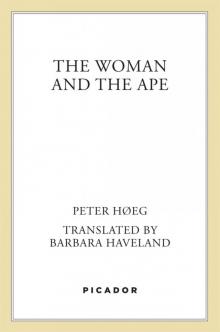 The Woman and the Ape
The Woman and the Ape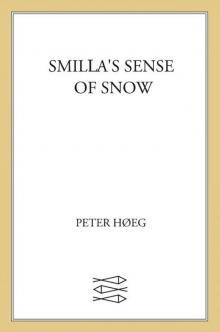 Smilla's Sense of Snow
Smilla's Sense of Snow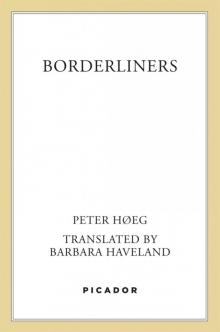 Borderliners
Borderliners The Susan Effect
The Susan Effect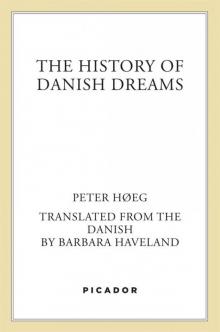 The History of Danish Dreams
The History of Danish Dreams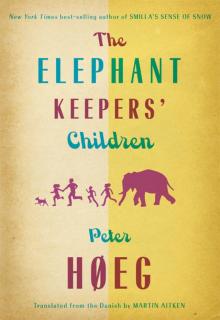 The Elephant Keepers' Children
The Elephant Keepers' Children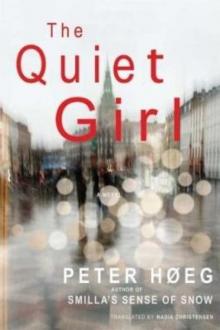 The Quiet Girl - Peter Hoeg
The Quiet Girl - Peter Hoeg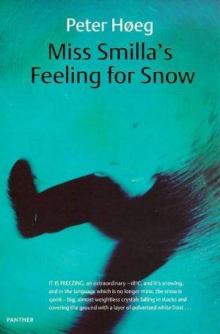 Smilla's Sense of Snow aka Miss Smilla's Feeling for Snow
Smilla's Sense of Snow aka Miss Smilla's Feeling for Snow